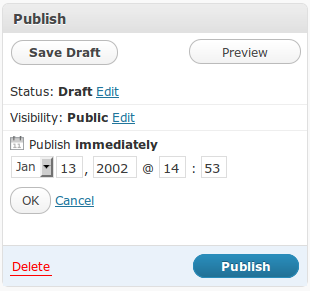One of the issues around eTextBooks is how to describe them, specifically by way of educational metadata in ePub. That’s something that on the face of it shouldn’t be too difficult to address (at least to the extent that we know how to describe any educational resource). One thing that would be useful in demonstrating different choices for educational metadata is an app or tool that will display any metadata found in the ePub package in a sensible way. As a bit of long shot I tried four eBook readers to see whether they would; they don’t. The details follow, if you’re interested, but do let me know if you know of any tool that might be useful.
The package metadata of an ePub can include a selection of Dublin Core elements and terms. These can be refined, for example you may have two dc:title elements with refinements to specify that one is the main title and the other the subtitle. You can also extend with elements from other XML namespaces, or if you prefer you can just link to a metadata record of your favourite flavour which can be either inside the ePub package or elsewhere on the web. Any of this metadata can relate to the eBook as a whole or some part of it, e.g. a single chapter or image. Without going into details there seems to be enough scope there to experiment with how educational characteristics of the eBook might be described.
But how to see the results? I took an ePub (a copy of O’reily’s EPUB 3 Best Practices, since it seemed likely to provide as good a starting point as I was going to find in a real book), made a copy, unzipped it and changed the values of the meta elements so that I could easily identify what elements were being displayed. For example I changed
<dc:title id="pub-title">EPUB 3 Best Practices</dc:title> to
<dc:title id="pub-title">dc:title</dc:title> and so on.
Here’s a list of the metadata elements in that file:
<dc:title id="pub-title"><dc:creator id="..." ><dc:publisher><dc:date><meta property="dcterms:modified"><dc:identifier id="pub-identifier"><dc:language id="pub-language"><dc:contributor> (repeated)<dc:rights><dc:subject><dc:description><meta id="meta-identifier" property="dcterms:identifier"><meta property="dcterms:title" id="meta-title"><meta property="dcterms:language" id="meta-language"><meta property="dcterms:rights"><meta property="dcterms:rightsHolder"><meta property="dcterms:publisher"><meta property="dcterms:subject"><meta property="dcterms:description><meta id="...." property="dcterms:creator">(repeated, different ids)<meta name="cover" content="cover-image"/><meta property="ibooks:specified-fonts">
I then looked at this with various eBook readers:
Readium
I had hopes for Readium since it is pretty much the reference implementation of EPUB3. It displayed
- dc:title
- dc:creator
- dc:publisher
- dc:date
- meta dcterms:modified
- dc:identifier
Note that it doesn’t even check for a valid value for dates.
Calibre
Calibre, while it doesn’t claim to support ePub3 is targetted at managing personal book libraries. It displays:
- dc:title
- dc:creator
- dc:subject (for tags)
- dc:description
- dc:publisher
It probably uses dc:language and dc:date (for published) as well but recognises that the values dc:language / dc:date aren’t valid.
Ideal Reader for Android
The Ideal Reader for Android is the other ePub3 reader I use. It displays
- dc:title
- meta dcterms:creator (just one of them)
- dc:date
- dc:publisher
- dc:description
- dc:subject
- dc:rights
iTunes
Finally I gave a chunk of diskspace to Apple
- dc:title
- dc:creator
- dc:title (again)
- dc:subject (in the info tab, as Genre)
Yep, title is there twice: the info tab shows dc:title in the Name and Album fields, so you can gauge the amount of effort that Apple have put into adapting iTunes for books.
What did I learn?
I learnt that none of the ePub reading/management apps or tools that I have show more than the bare minimum of metadata, even if it is there. None of them will be much good for trying out ideas for how educationally characteristics can be described since I strongly suspect that none of it will be viewable. That’s not too surprising, especially when you consider that none of the tools I looked at are geared around resource discovery, but I can’t really go uploading dummy ePub files to book seller sites just to see what they look like. May be any meaningful exploration/demonstration of educational metadata in ePub is going to need a bespoke application, but if you know of a tool that might be helpful do drop me a line.









